Archive for June 2016
Music Matters in the Land of Dementia
How can creating a personal playlist, listening to favorite tunes, singing simple melodies, and pretending to conduct a symphony improve your life? Come to this free workshop and find out.
Music Matters in the Land of Dementia (and Everywhere!) An Interactive Program for Family Friends, Professional Care Partners, Activity Professionals, Musicians, and More
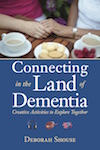 In this lively one-hour session, coming up on July 20, we will share ideas for using music to deepen connections with people who are living with dementia. Some of these ideas, gleaned from top innovators and researchers, are from my upcoming book, Connecting in the Land of Dementia: Creative Activities to Explore Together. According to numerous studies, music improves the lives of those living with dementia by reducing the need for psychotropic drugs, increasing socialization, and relieving depression. The event is going to be joyful and fun and we’d love to experience it with you.
In this lively one-hour session, coming up on July 20, we will share ideas for using music to deepen connections with people who are living with dementia. Some of these ideas, gleaned from top innovators and researchers, are from my upcoming book, Connecting in the Land of Dementia: Creative Activities to Explore Together. According to numerous studies, music improves the lives of those living with dementia by reducing the need for psychotropic drugs, increasing socialization, and relieving depression. The event is going to be joyful and fun and we’d love to experience it with you.
Here’s the workshop information:
Deepen your connections, increase communications, and ratchet up your fun quotient by adding music into your caregiving journey. Authors and dementia advocates Ron Zoglin and Deborah Shouse team up with guitarist Rod Fleeman and singer Cynthia Schroer for this hands-on session. They’ll share easy music-oriented ideas that can soothe anxieties and unlock creativity in people who are living with dementia, as well as splash notes of joy and renewal into the care partners’ lives.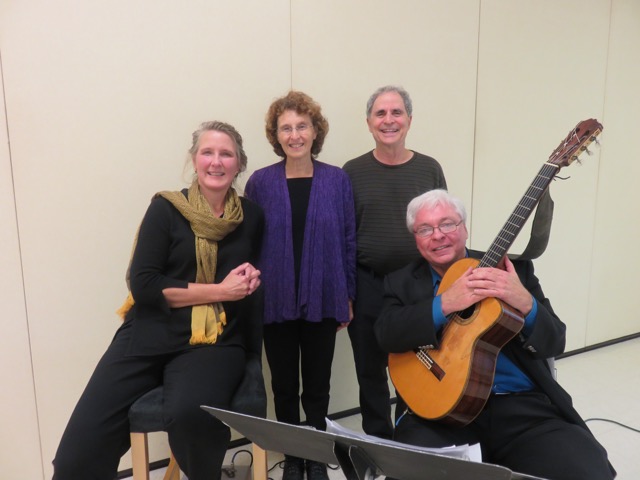
We are partnering with Shalom University to present this free session on July 20th from 10:00 to 11:00 at Village Shalom, at corner of 123rd and Nall, 5500 W 123rd Street, OP 66209. To sign up for this musical experience, just call Bree at (913) 266-8469 or email vsu@villageshalom.org as soon as possible.
Victor Hugo said it so beautifully: Music expresses that which cannot be put into words and that which cannot remain silent.
Music Matters
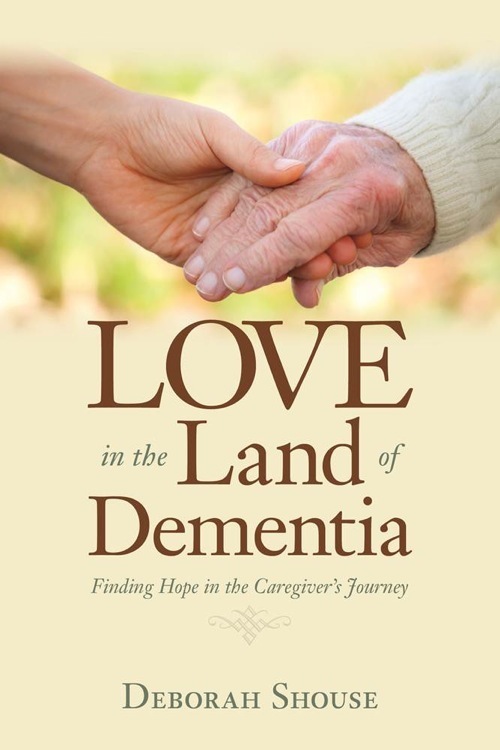 During my mom’s dementia journey, music often inspired and connected us. Here is one of those melodic moments, excerpted from my book, Love in the land of Dementia: Finding Hope in the Caregiver’s Journey. The story is set in my mom’s memory care community.
During my mom’s dementia journey, music often inspired and connected us. Here is one of those melodic moments, excerpted from my book, Love in the land of Dementia: Finding Hope in the Caregiver’s Journey. The story is set in my mom’s memory care community.
Rochelle, the activity director, sticks in another tape and soon Stardust is playing.
“Let’s dance,” she says, motioning everyone to stand.
Mom looks up and I offer her my hand.
“Want to dance?” I ask her.
“What?”
“Want to dance?” I repeat, making a swirling motion.
“What else,” she says, standing up.
My parents have danced to this song many times, my mother coaxing my father onto the dance floor. I hold hands with Mom and move back and forth to the music. She laughs and does the same. I twirl her, and she walks around in a jaunty little circle. For a moment, her energy and charm have returned. I feel like I have found my long-lost mother. If my father were here, he would not be surprised. He is certain she will return to him and takes every word, every gesture of affection, every smile as a sign of hope.
“Hope is everything,” Dad told me just last week. “I find something hopeful and I milk it for all it’s worth. If it doesn’t work out, then I search for something else. Otherwise, I am in despair.”
I twirl my mom again. It is actually our first real dance together…
Deborah Shouse is the author of Love in the Land of Dementia: Finding Hope in the Caregiver’s Journey.
COMING SOON: CONNECTING IN THE LAND OF DEMENTIA: CREATIVE ACTIVITIES TO EXPLORE TOGETHER
How to Create a Network of Dementia Friends
Ron and I recently traveled to Europe and we were lucky to meet with several creative thought leaders working in the field of dementia. Over the next weeks, we’ll share some of their insights with you, ideas we can incorporate into our every day lives as care partners, friends, and dementia advocates. We met with Philippa Tree, Senior International Officer Alzheimer’s Society UK, in a charming coffee shop located near the Tower of London.
The U.K. has more than one and a half million Dementia Friends, and 10,000 Dementia Friends Champions, volunteers who deliver the Information Sessions. Their goal–four million Dementia Friends in the next two years.
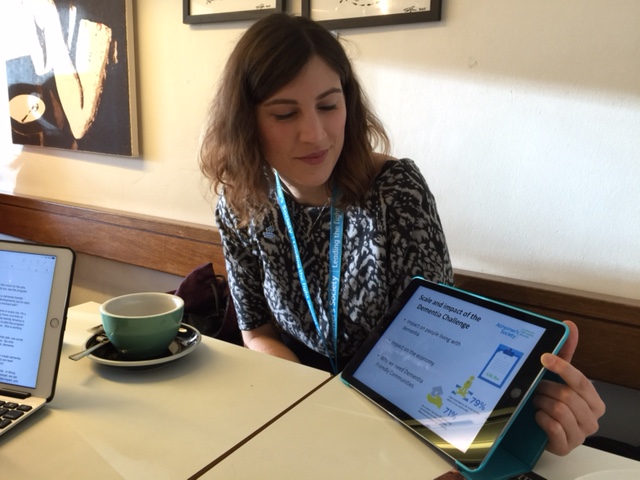 Philippa Tree is part of the Dementia Friends team at Alzheimer’s Society UK. The Dementia Friends programme is a social action movement that aims to transform the way England and Wales think, act, and talk about dementia. It started in 2012 when the Prime Minister of the United Kingdom, in partnership with Alzheimer’s Society UK, urged his country to focus on building dementia-friendly communities. He became a Dementia Friend and challenged others to join him.
Philippa Tree is part of the Dementia Friends team at Alzheimer’s Society UK. The Dementia Friends programme is a social action movement that aims to transform the way England and Wales think, act, and talk about dementia. It started in 2012 when the Prime Minister of the United Kingdom, in partnership with Alzheimer’s Society UK, urged his country to focus on building dementia-friendly communities. He became a Dementia Friend and challenged others to join him.
The free Dementia Friends Information Sessions help people understand what living with dementia might be like. The sessions also offer small action steps so people can make a difference to those affected by dementia in their community. Anyone of any age can be a Friend by attending an information session or watching an online video.
Philippa’s work with Dementia Friends extends beyond the UK and across the world. She’s recently been collaborating with partners in the United States to roll out a pilot Dementia Friends program in the near future. At the recent Alzheimer’s Disease International Conference in Budapest, Philippa facilitated a session with countries including Nigeria, Germany, Israel, Scotland, Canada, and Indonesia.
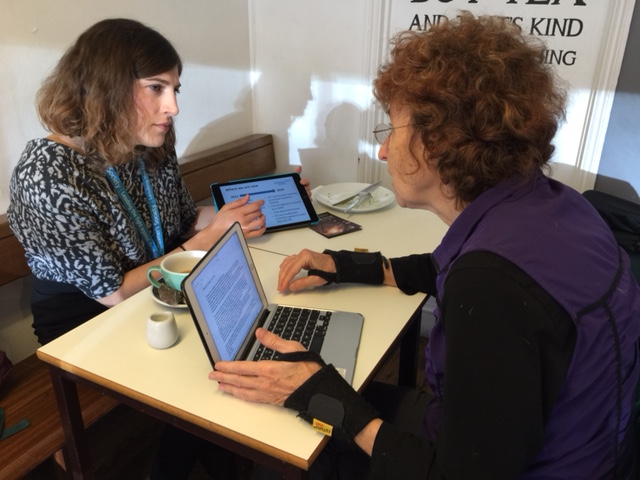 “After only two years, Dementia Friends has become one of the UK’s biggest social movements on any disease.” Philippa says. “We’re working on using positive language and spreading positive messages as we tackle the stigma around dementia. My current role is to support countries worldwide to implement a Dementia Friends program, and to learn and share experiences.”
“After only two years, Dementia Friends has become one of the UK’s biggest social movements on any disease.” Philippa says. “We’re working on using positive language and spreading positive messages as we tackle the stigma around dementia. My current role is to support countries worldwide to implement a Dementia Friends program, and to learn and share experiences.”
While Philippa and her team are working in England and Wales, and worldwide, each of us can make a difference on a local level. Here are examples of action steps people have enjoyed taking:
- Share positive stories about friends and family who are living with dementia. This helps reduce the social stigma.
- Volunteer for creative programs and events for those who are living with dementia.
- Spend time visiting family and friends who are living with dementia.
- Talk to other care partners and ask how their lives are enriched through their caring experiences.
For more information about the Dementia Friends programme, please visit their website : www.dementiafriends.org.uk.
Deborah Shouse is the author of Love in the Land of Dementia: Finding Hope in the Caregiver’s Journey.
COMING SOON: CONNECTING IN THE LAND OF DEMENTIA: CREATIVE ACTIVITIES TO EXPLORE TOGETHER
Three Marvels of Misplacing
“These days I am constantly losing things,” a friend tells me. I understand, because I frequently misplace objects and even words!
“I don’t know where my glasses are,” Mom tells me. I bite my lip; she’s been misplacing things all day. We are supposed to be spending a day drawing and painting, trying to connect mom with the artist she used to be. We are supposed to bake cookies together and look through magazines. But I’ve been spending much of the time crawling around, looking under the sofa and chairs and between the cushions for the disappearing glasses.
“Let’s make our cookies. You won’t need your glasses for that,” I say.
“I need my glasses.”
As I search, I wonder when it became a drudgery instead of a joy to find things. One of my favorite childhood games was Hide ‘N Seek. I loved being the Seeker, loved the surprise of finding someone in a tucked away, mysterious place. I had a special trick I used when I was “It.” I would close my eyes and say, “If I were Dan, where would I hide?” Then an image floated into my mind and I’d race to the hiding place. Half the time, I was right.
Do I still have “it?” I close my eyes and think, “If I were Mom’s glasses, where would I be?” The refrigerator comes to my mind. I rush into the kitchen and fling open the refrigerator door, only to see the usual chaos. But I’m hungry, so I reach for an apple. Behind the fruit is a pair of reading glasses, sprawled across the shelf.
Triumphantly, I take the glasses to Mom.
“These feel nice,” she says.
Not only has my mother reminded me of the importance of creativity, curiosity and play, but she also discovered a great summer time tip: chill your glasses and cool off your face.
Deborah Shouse is the author of Love in the Land of Dementia: Finding Hope in the Caregiver’s Journey.
COMING SOON: CONNECTING IN THE LAND OF DEMENTIA: CREATIVE ACTIVITIES TO EXPLORE TOGETHER
A Unique Opportunity to Learn from Creative Pioneers
I just received this webinar invitation from Garuth Chalfont, who is a pioneer in using nature with those who are living with dementia. I interviewed Garuth for my upcoming book and he is filled with great ideas. I am going to attend his free webinar and I thought it could be of interest to you. Please feel free to share this with others. It’s a unique opportunity to learn from innovators in this creative field.
www.lancaster.ac.uk/fhm/research/centre-for-ageing-research/#newsampevents Click on the link and simply scroll down to “Non-drug Treatments to Intervene and Prevent Dementia.” To register, email Jan and she will put you on the list.
Meanwhile, these tips from Garuth are featured in Connecting in the Land of Dementia: Creative Activities to Explore Together, which comes out in September.
“Research shows that nature-based activity is therapeutic and is essentially a form of treatment for dementia symptoms, helping a person remain at home longer,” says Garuth Chalfont PhD, American Society of Landscape Architects, and author of the Dementia Green Care Handbook. (You can download this book for free by going to Garuth’s website: www.chalfontdesign.com/ Garuth is internationally known for his work in designing, building and researching gardens that benefit people with dementia. He also partners with care facilities and families, helping them integrate nature into their living quarters and their outdoors.
Gathering flowers, walking a tree-lined sidewalk, plucking a cherry tomato off its vine, watering a house plant, gazing out the window at chickadees—these meaningful natural activities increase pleasure, relaxation, social interactions, and sensory stimulation.
“Enjoying the garden goes beyond just walking around,” Garuth says.
Imagine you’re hosting a guided tour of your yard. What is the most thrilling part of your lawn? A blooming rose bush? A bird bath? A wise old fir tree?
“By creating a tour, you’re taking a new look at your environment. You’re telling a story and engaging your partner,” Garuth says.
Stir up conversation by focusing on one area at a time. Perhaps discuss the hanging bird feeder. Or a seashell you two found on your last vacation. Then observe the birdbath or other water feature. Do you have a bench? Sit down and talk about what you see. Create a wow ending with something that is fun and dramatic, such as a ceramic gnome peeking from behind a rock. Seeing your yard as a living story may inspire you to add in a playful spinner, a cute stone animal, or a beautiful rock.
Deborah Shouse is the author of Love in the Land of Dementia: Finding Hope in the Caregiver’s Journey.
COMING SOON: CONNECTING IN THE LAND OF DEMENTIA: CREATIVE ACTIVITIES TO EXPLORE TOGETHER
